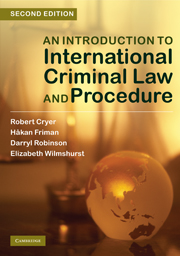Book contents
- Frontmatter
- Contents
- Preface to the Second Edition
- Table of Cases
- Table of Treaties and other International Instruments
- Table of Abbreviations
- PART A INTRODUCTION
- PART B PROSECUTIONS IN NATIONAL COURTS
- PART C INTERNATIONAL PROSECUTIONS
- PART D SUBSTANTIVE LAW OF INTERNATIONAL CRIMES
- PART E PRINCIPLES AND PROCEDURES OF INTERNATIONAL PROSECUTIONS
- PART F RELATIONSHIP BETWEEN NATIONAL AND INTERNATIONAL SYSTEMS
- 20 State Cooperation with the International Courts and Tribunals
- 21 Immunities
- 22 Alternatives and Complements to Criminal Prosecution
- 23 The Future of International Criminal Law
- Index
- References
23 - The Future of International Criminal Law
from PART F - RELATIONSHIP BETWEEN NATIONAL AND INTERNATIONAL SYSTEMS
Published online by Cambridge University Press: 05 June 2012
- Frontmatter
- Contents
- Preface to the Second Edition
- Table of Cases
- Table of Treaties and other International Instruments
- Table of Abbreviations
- PART A INTRODUCTION
- PART B PROSECUTIONS IN NATIONAL COURTS
- PART C INTERNATIONAL PROSECUTIONS
- PART D SUBSTANTIVE LAW OF INTERNATIONAL CRIMES
- PART E PRINCIPLES AND PROCEDURES OF INTERNATIONAL PROSECUTIONS
- PART F RELATIONSHIP BETWEEN NATIONAL AND INTERNATIONAL SYSTEMS
- 20 State Cooperation with the International Courts and Tribunals
- 21 Immunities
- 22 Alternatives and Complements to Criminal Prosecution
- 23 The Future of International Criminal Law
- Index
- References
Summary
Introduction
International criminal law has developed at an unprecedented rate since the early 1990s. It is therefore too early for us to issue any final judgments but it is the purpose of this chapter to evaluate recent developments as far as possible, and to look tentatively to the future of international criminal law.
International courts and tribunals
It is a commonplace, because it is largely correct, that the catalyst for the revival of international criminal law was the creation of the ad hoc Tribunals by the Security Council in the early to mid 1990s. Although the project for an international criminal court had received some increased attention since its reinclusion on the General Assembly's agenda in 1989, this was not seen as likely to bear fruit. The creation of the ad hoc Tribunals, on the other hand, showed that such tribunals could be established in a reasonably short time, and the focus of debate shifted from the question whether such tribunals were a realistic possibility to how they could be improved.
The ad hoc Tribunals have been criticized almost from the start as being expensive and bureaucratic, as well as producing what some consider to be show trials. Nonetheless, these experiments (as that is what they were at their beginnings) have to be credited not only with a reasonable level of success in their own proceedings, but also with providing the impetus for the creation of what many thought was a near impossibility in the international legal order, a permanent international criminal court.
- Type
- Chapter
- Information
- An Introduction to International Criminal Law and Procedure , pp. 579 - 590Publisher: Cambridge University PressPrint publication year: 2010



